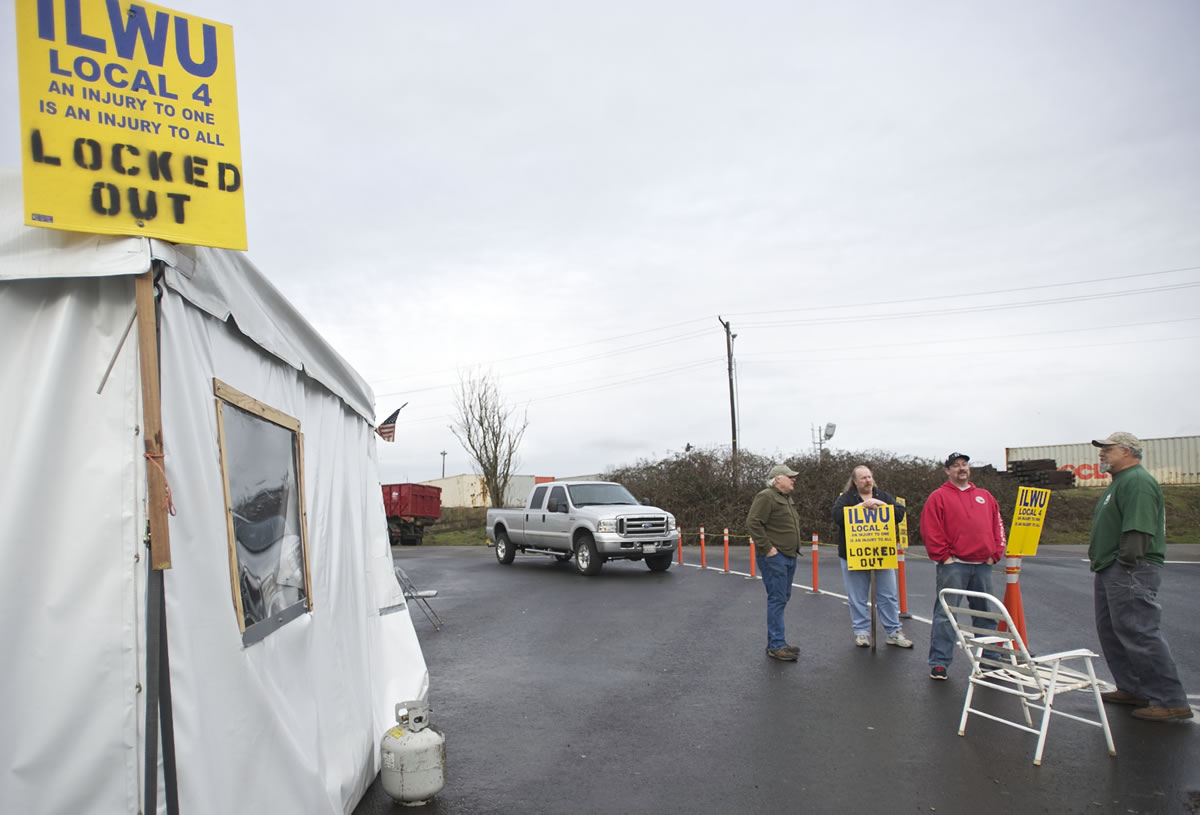PORTLAND — West Coast employers have paid Vancouver Longshore union members about $485,000 since June 30 for not working during an ongoing lockout by United Grain Corp. that began a year ago Thursday.
That’s in addition to about $547,000 reported previously that was paid to idled Portland dockworkers in the same seven-month period during a lockout by Columbia Grain Inc.
Taken together, the figures released to The Oregonian by the Pacific Maritime Association show that the West Coast employers’ group has shelled out more than $1 million since June 30 to Portland-area Longshore union members who lack work for a week or more. That’s about half the amounts paid for not working along the entire West Coast since the fiscal year began.
An idled senior Longshore union member who is available to work and meets other conditions of a Pay Guarantee Plan in the coast-wide labor contract can receive up to about $70,000 a year — far short of the low six-figure incomes received by many senior dockworkers. So-called casual workers, who have not become Class A or Class B Longshoremen, aren’t eligible for the PGP payments, which come from a West Coast employers’ fund amounting to $20 million this year.
Pat McCormick, a spokesman for the grain handlers, believes that without the PGP pay, terminal owners and the International Longshore and Warehouse Union might have made more progress in contract talks. He also says the cushion provided by guaranteed pay reduces Longshore concern about the potential departure of Hanjin Shipping Co. from Portland’s Terminal 6 container yard, the site of separate labor disputes.
“It would appear that it would promote some difference in perspective among members of the union,” said McCormick, explaining that union disunity could result from disparities between members eligible or ineligible for guaranteed pay. Disunity complicates bargaining, he said.
But McCormick declined to say whether disunity is evident among ILWU locals and union managers in the current grain talks. The closed-door negotiations continue, with federal mediator Beth Schindler presiding.
Jennifer Sargent, a Longshore union spokeswoman, did not respond Thursday to questions concerning McCormick’s points, the status of the grain negotiations and the significance of the lockout’s one-year anniversary this week. The Oregonian also asked her to comment on the pay guarantee plan, Gov. John Kitzhaber’s request Wednesday for an independent review of Terminal 6 equipment issues, and trucking companies’ contentions that Longshore workers create delays at the North Portland container yard.
Sargent sent a comment by email, saying: “The Oregonian’s stated anti-union political agenda is reflected in its increasingly inaccurate, sensationalistic and biased coverage of local port issues, and we will not be contributing to a story in which the reporter’s conclusions have already been drawn.”
One Longshoreman said in a letter to The Oregonian that the pay guarantee plan first appeared in the West Coast Longshore contract in 1971. Jared Faker, of ILWU Local 23 in Tacoma, said the plan’s main function is to provide income and to maintain a labor force at small ports where work is intermittent.
“The qualifications are such that you must make yourself available and accept any and all work, day and night, for the entire week,” Faker said. “It’s essentially like being on call 24/7. Miss a day or a shift, you lose the entire week. It’s far, far, far from being desired or coveted.”
“Trust me, there’s not a Longshoreman on the coast that wouldn’t rather be working,” Faker said. “And there isn’t a Longshoreman in Portland that would make nearly the money through PGP that they presently do working.”
Negotiators may address the pay guarantee program in upcoming talks to renew the six-year West Coast Longshore contract that will expire July 1, McCormick said.



